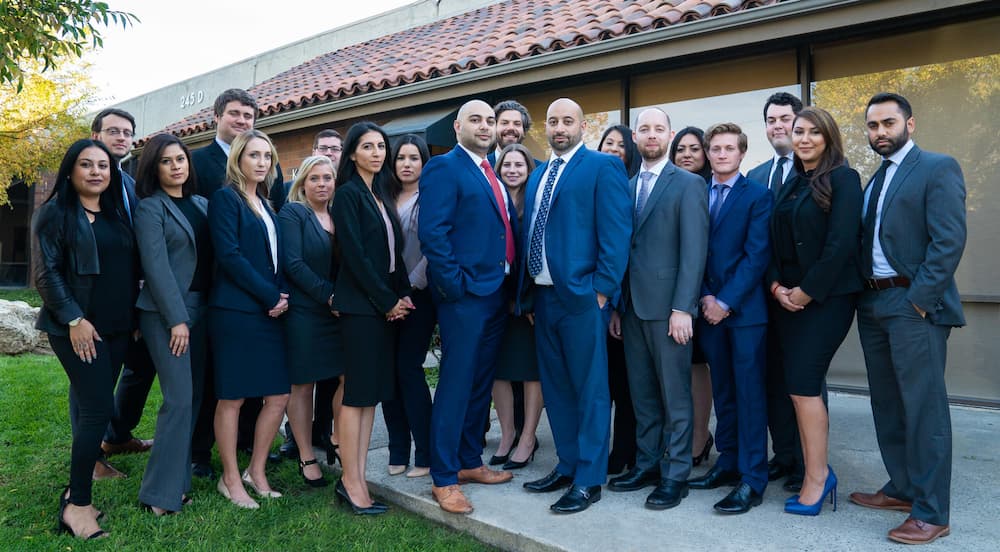
Tromberg, Morris & Poulin, PLLC is a law firm that handles debt collection efforts for creditors. These creditors may include banks, credit card companies, auto loan financiers, or other businesses that claim you owe money.
Facing a lawsuit or debt collection efforts can create stress and uncertainty. Many people feel overwhelmed by legal paperwork, phone calls, and possible wage garnishments or liens on property.
Tromberg, Morris & Poulin could contact you with letters, phone calls, or a summons and complaint indicating that you are being sued for unpaid debt.
The experienced California debt collection harassment lawyers at Kazerouni Law Group, APC, have extensive experience helping consumers challenge or negotiate their debts.
If you received any communication from Tromberg, Morris & Poulin, especially a lawsuit, timely action helps protect your rights. Meeting with an attorney can clarify your options even if you are unsure about the debt’s validity.Kazerouni Law Group can step in to negotiate settlements, assert valid defenses, or guide you through litigation. We are available to evaluate your situation at no cost.
Common Reasons Tromberg, Morris & Poulin, PLLC May Sue
Many people wonder why Tromberg, Morris & Poulin, PLLC targeted them with a collection lawsuit.
Below are common situations that often lead Tromberg, Morris & Poulin, PLLC to pursue legal action.
- Unpaid Credit Card Debts. Outstanding balances on credit cards are among the most common types of debt. If payments have lapsed or stopped entirely, collection law firms may file suit.
- Personal Loans. Personal loans from banks, credit unions, or online lenders can end up in default. When that happens, the lender might hire Tromberg, Morris & Poulin to recover the balance, interest, and fees.
- Medical Bills. Healthcare costs can be high, and unpaid medical bills often get assigned or sold to debt collectors. A lawsuit might follow if a settlement or payment arrangement cannot be reached.
- Auto Loan Deficiencies. If a repossessed car sells for less than what is owed, the lender might claim you are responsible for the remaining balance. This deficiency balance may become the subject of a debt collection lawsuit.
- Retail Credit Accounts. Store-branded credit cards and other retail credit arrangements can also lead to collection actions if payments stop.
Why Responding Matters

When a summons and complaint arrive from a law firm like Tromberg, Morris & Poulin, choosing to ignore it can result in a default judgment.
Once the court enters a default judgment, creditors have legal tools to garnish wages, levy bank accounts, or place liens on cars and homes. Responding within the specified deadline helps avoid default and creates an opportunity to raise any defenses or negotiate a settlement.
Potential Consequences of Ignoring a Lawsuit
- Wage Garnishment. Courts can allow creditors to take a portion of your paycheck to cover the alleged debt.
- Bank Account Levy. Creditors may freeze or seize funds in your bank account if they have a valid judgment against you.
- Liens on Property. A lien on your real estate or vehicle might complicate selling or refinancing.
- Ongoing Litigation Costs. Ignored lawsuits can generate additional fees and interest, increasing the debt.
Legal Defenses to Debt Collection Harassment and Your Rights
Even if you believe you owe the debt, certain defenses might apply. Collection law firms must prove their case in court, and they are required to follow consumer protection laws like the Fair Debt Collection Practices Act (FDCPA).
Under the FDCPA, collectors cannot engage in harassment, make false statements, or violate your privacy when seeking repayment. If Tromberg, Morris & Poulin, PLLC fails to abide by these rules, you may have grounds for a counterclaim.
Examples of possible defenses:
- Incorrect Debt Amount: The amount claimed might include unauthorized fees or inaccurate interest calculations.
- Lack of Proper Documentation: The collector must show accurate records of the debt’s ownership, assignment, and balance.
- Expired Statute of Limitations: Debts often have a statute of limitations. If the time frame to sue for a debt has passed, you can raise that defense.
- FDCPA Violations: If a collector uses intimidation, deception, or harassment, it may invalidate some claims or entitle you to damages.
Consulting with a skilled attorney at Kazerouni Law Group can help determine which defenses apply to your circumstances.
Kazerouni Law Group’s Role in Protecting Consumers

Kazerouni Law Group, APC, has helped tens of thousands of consumers navigate collection lawsuits. Our attorneys tailor strategies based on each client’s situation. Some people want to fight the lawsuit and assert every possible defense, while others prefer a negotiated settlement to avoid a court battle. In each case, our goal is to seek results that align with client objectives.
How We Handle Lawsuits from Tromberg, Morris & Poulin
- Case Review: An attorney from Kazerouni Law Group will discuss the details of your case free of charge. This discussion may include reviewing the lawsuit documents, analyzing the alleged debt, and finding potential defenses.
- Litigation Strategy: Our attorneys prepare and file an answer if you want to fight in court. This includes asserting defenses such as inaccurate balances, improper service of process, or FDCPA violations.
- Negotiation and Settlement: We often negotiate settlement plans that reduce the debt or spread out payments in a manageable way. Avoiding court appearances can reduce stress and legal expenses.
- Fee Structure: Our fees for defending a lawsuit are 10% of the total debt or $850, whichever is greater, plus court filing fees. We can work out a payment arrangement to fit your budget.
- Possible No-Cost Representation: If a collector violates laws protecting consumers, our representation may be at no cost to you. Sometimes, you could be eligible for compensation if a collector breaks state or federal regulations.
Avoiding Default Judgments
If you have been served, responding to Tromberg, Morris & Poulin, PLLC helps prevent a default judgment. Courts typically provide a specific period—often 30 days—to file a formal response. Missing this deadline allows the collector to request a judgment in their favor without needing to prove the case in detail.
Steps to Avoid Default
- Read every page of the lawsuit and note the deadline to respond.
- Consult with an attorney as soon as possible.
- Do not throw away or ignore legal documents, even if they seem confusing or incorrect.
- Gather evidence that disputes the debt, such as proof of payment or correspondence with the original creditor.
Understanding the FDCPA and Your Rights

The FDCPA sets guidelines for third-party collectors. Tromberg, Morris & Poulin, PLLC must follow these rules when contacting you about alleged debts. Key FDCPA provisions prohibit harassment, misrepresentation, and specific contact with third parties.
Harassment
Debt collectors cannot use profanity, swear at you, threaten violence, or engage in repeated calling designed to annoy or harass you. Unless you expressly agree otherwise, they are expected to restrict calls to reasonable hours—generally between 8 a.m. and 9 p.m. Contacting you outside these hours without permission may violate consumer protection laws, and any threatening or abusive behavior is strictly prohibited.
False Statements
Collectors are barred from misrepresenting who they are or the nature of your debt. They cannot pose as government officials, accuse you of committing a crime for not paying, or lie about how much you owe. Nonpayment of a consumer debt is not typically a crime, and threatening to seize your property without valid legal grounds is forbidden. Any attempt to deceive or intimidate you regarding the debt’s status or consequences goes against federal regulations.
Contacting Third Parties
Debt collectors are generally allowed to reach out to third parties like your employer, friends, or family only for the limited purpose of finding your current contact information. They cannot, however, share details about your debt, discuss specific balances, or threaten anyone’s job or well-being. Any conversation regarding the debt should be directed at you or your attorney rather than unauthorized individuals.
Verifying the Debt: Your Right to Dispute
It is always possible to dispute a debt, particularly if you believe the balance is incorrect, already paid, or not yours to begin with. The FDCPA requires collectors to verify a debt upon request.
Sending a written dispute letter or consulting with an attorney can start the verification process. You can request verification and an itemization of the amount claimed.
Working with an attorney is the safest approach for disputing a debt collection lawsuit. A lawyer can ensure proper language and timing, so the collector must provide documentation.
If the collector cannot verify the debt, they must cease collection efforts, and any related lawsuit may fail in court. Verification often includes the original creditor’s name, the account number, and details on the current amount owed.
The Telephone Consumer Protection Act (TCPA) and Collection Calls
Alongside the FDCPA, the Telephone Consumer Protection Act (TCPA) limits how businesses and collectors can contact you by phone. Kazerouni Law Group is particularly interested in two types of TCPA cases:
Pre-recorded Calls
Calls where an automated or pre-recorded voice is used to reach you.
DNC (Do-Not-Call) Cases
Violations occur when your number is on the National Do Not Call Registry and you receive multiple calls or texts within 12 months of registration. Text messages can also violate the TCPA if you are on the Do Not Call Registry and receive repeated communications.
If Tromberg, Morris & Poulin, PLLC, or any other collector contacts you through automated calls or repeated communications despite a DNC listing, you may have additional legal claims.
Why Kazerouni Law Group?

Our attorneys focus on consumer protection law. Decades of combined experience allow us to recognize common collector tactics and respond effectively. Every client meets with an actual attorney who reviews their file and explains each stage of the process. We offer flexible scheduling, and our initial consultation is free.
Client-Focused Representation
Debt lawsuits can be stressful, and many people fear going to court. Our team understands those concerns. At Kazerouni Law Group, we prioritize clear communication. We go over likely scenarios, possible outcomes, and recommended strategies. Clients comfortable with the process make informed decisions about litigating or settling.
- Open Communication: You can reach out via phone, email, or online.
- Full Explanation of Your Rights: We explain consumer protection laws, such as the FDCPA, TCPA, and other regulations, in plain language.
- Focused Strategies: Some cases require aggressive litigation, while others benefit from swift settlements. We tailor our approach to your needs.
If You Owe the Debt
Even if you acknowledge owing the debt, you might have defenses if the collector has not followed the law. Alternatively, you can still reach a settlement that saves money or provides more manageable payment terms. Some collectors are willing to reduce the principal balance rather than risk an expensive legal battle.
If You Disagree with the Debt
If you suspect errors or have never received validation of the debt, it may be possible to contest the lawsuit entirely. You have a right to demand documentation proving the account balance, the original creditor, and a clear chain of ownership if the debt was sold. Challenging improper collection methods or unverified debts can lead to dismissals or favorable settlements.
Avoiding Collection Harassment
Knowing your rights under the FDCPA can help stop harassing phone calls or misleading statements. Once you have legal counsel, collectors generally must communicate through your attorney. Forward any continued calls or letters to your lawyer. If the collector violates the FDCPA, your attorney can explore legal remedies on your behalf.
Legal Protection for Consumers
Several laws may protect you in addition to the FDCPA and TCPA:
- Fair Credit Reporting Act (FCRA): Prohibits inaccurate reporting of debts to credit bureaus.
- State Consumer Protection Laws: Various states have additional protections that complement federal law.
- Bankruptcy Laws: In extreme cases, you may consider bankruptcy relief. Consult with a qualified attorney to explore if that option fits your situation.
Contact Kazerouni Law Group for a Free Consultation
If Tromberg, Morris & Poulin, PLLC has filed a lawsuit against you or is contacting you about a debt, contact Kazerouni Law Group, APC. We handle all types of consumer debt cases, from credit card balances to medical bills and auto deficiencies. Our attorneys understand the stress of dealing with collectors, and we work diligently to resolve these claims or fight them in court.

You have options when facing a lawsuit from Tromberg, Morris & Poulin. Kazerouni Law Group provides guidance and representation, so you are not alone in handling aggressive collection efforts. Whether you seek negotiation, dispute the debt’s validity, or plan to file counterclaims, our attorneys are here to support you.
Ready to speak with an attorney? Submit our brief online evaluation form or call our office. We will review your lawsuit from Tromberg, Morris & Poulin, PLLC, and discuss legal defenses, settlement strategies, and potential violations of consumer protection laws at no cost to you. Fill out the evaluation form to the right or call us at 949-612-9999 to set up your free consultation.